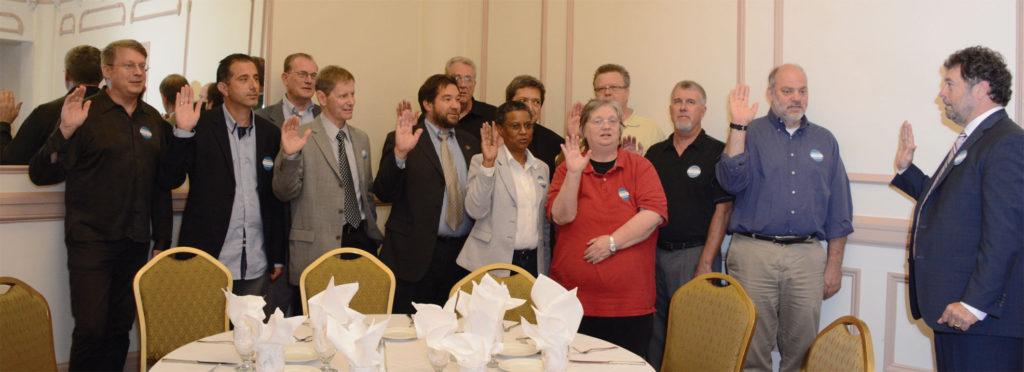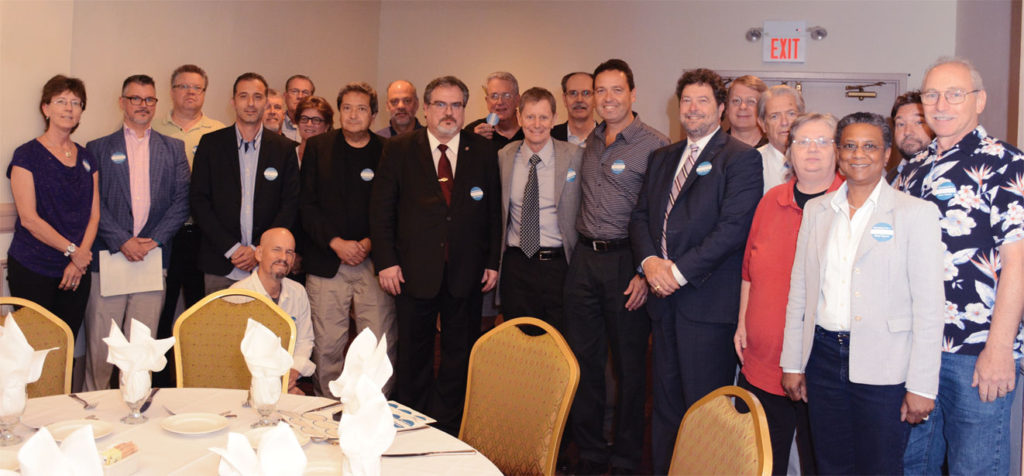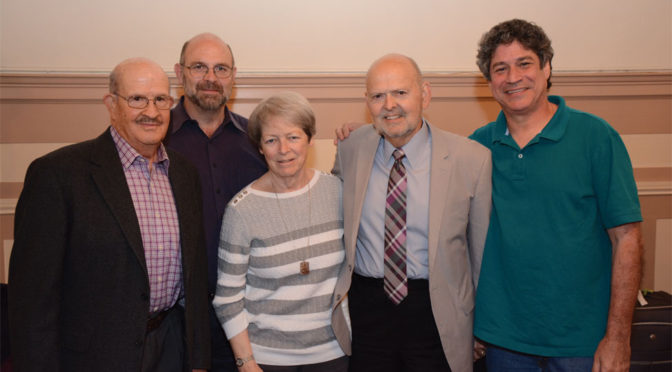The 20th Annual Theater Musicians Association (TMA) Conference was held at the Hotel Whitcomb in San Francisco, August 17-18. TMA Vice President Walter Usiatynski chaired Monday’s session. Usiatynski, TMA Northern California Chapter President Tom Bertetta, and Local 6 (San Francisco, CA) President David Schoenbrun welcomed the attendees.
AFM President Ray Hair made a very interesting and informative PowerPoint presentation on Media Convergence & Performance Rights. He recounted the AFM’s history from 1896 forward, eventually reviewing all types of AFM media agreements. He explained the tensions between US and international agencies that collect royalties and the progress that’s been made. He also discussed the AFM Integrated Media Agreement (IMA) and the SAG-AFTRA Fund/SoundExchange.

Above, AFM President Hair swears in 2015–2016 TMA Executive Board members present. Elected were: President Tom Mendel of Local 10-208 (Chicago, IL), Vice President Walter Usiatynski of Local 802 (New York City), Secretary-Treasurer Mark Pinto of Local 9-535 (Boston, MA), Director for Broadway Jan Mullen of Local 802, Director for the Membership-at-Large Lovie Smith-Wright of Local 65-699 (Houston, TX), and Director for Travelers Angela Chan of Local 369 (Las Vegas, NV). Locally elected chapter directors include: Tony D’Amico (Boston), Dan Johnson (Chicago), Alan Ayoub (Detroit), David Philippus (Las Vegas), Steve Sanders (Northern California), Jeff Martin (Phoenix), Paul Castillo (Southern California), Vicky Smolik (St. Louis), and Paul Schultz (Washington, DC).
Among the topics discussed in my TMA President’s Report were: preparing for the Pamphlet B Negotiations (current contract expires 3/11/16); the formation of the Theatrical Orchestrations Committee because some publishing houses are no longer making some of the larger orchestrations available; reduced orchestrations; the formation of the TMA Officers & Members Video Training Committee to produce training videos for TMA officers and members on subjects such as running meetings, use of social media, etc. These will be great learning tools and located in our TMA Officers Toolbox.
TMA Vice President Walter Usiatynski gave a report on current and upcoming challenges, such as reduced orchestrations, nonunion tours, and our health care crisis. TMA Secretary-Treasurer Mark Pinto discussed TMA finances. All TMA chapter directors gave reports either directly or through their alternate directors.
Recording Musicians Association (RMA) President Marc Sazer and Regional Orchestra Players Association (ROPA) Vice President Nancy Nelson eloquently gave player conference reports. I read equally eloquently reports written by International Conference of Symphony and Opera Musicians (ICSOM) Chair Bruce Ridge and Organization of Canadian Symphony Musicians (OCSM) President Robert Fraser.
Membership-at-Large Director Lovie Smith-Wright read her report. Usiatynski read reports from Director for Broadway Jan Mullen and Director for Travelers Jamie Schmidt.
AFM Director for Touring, Theatre, Booking and Immigration Michael Manley reported on Pamphlet B tours currently on the road using comparative data of Full Pamphlet B tours and those touring under the SET Agreement. An interesting statistic was how overages have been a great way to equalize the salary differences between the two.
Usiatynski gave the Legislative Standing Committee Chair report and read the Chapter and Membership Recruitment Standing Committee Chair report written by Debbie Brooks. Lovie Smith-Wright reported on the Diversity Committee.
To my knowledge, for the first time, the TMA Executive Board limited guest speakers in order to hold breakout sessions to identify issues affecting musical theatre musicians and possible solutions. Topics included: reduced orchestrations, theatre musicians asked to supply headshots and/or audition tapes, keyboard subbing, as well as the questions “what is TMA doing that it should not be doing?” and “what is TMA not doing that it should be doing?”
The second day began with the Executive Board report. TMA Webmaster Stephen Green gave his report. AFM Secretary-Treasurer Sam Folio reported on political and social activism and the upcoming 100th AFM Convention. AFM IEB Member and Local 802 (New York City) President Tino Gagliardi talked about the relationship that he has with the British Musicians’ Union and common interests and concerns between London’s West End productions and those on Broadway. Paul Castillo gave a report on the Local Conferences’ Council/Players’ Conferences Council (LCC/PCC) Conference in Las Vegas last month.

(Right) Following a special report from Local 161-710 (Washington, DC) President Ed Malaga on organizing the Olney Theatre, all of the members at our conference did a photo shoot wearing stickers congratulating Olney Theatre musicians on their successful unionization.
It was a distinct honor and highlight of this the 20th Annual Conference to have a panel discussion with the original TMA Steering Committee who helped found TMA. They included: Gordon Messick (chair), David Schoenbrun (secretary), Larry Souza (treasurer), Artie Storch (editor of Pit Bulletin), and Melinda Wagner (advisor). Special mention was made of deceased member Wayne Allen (advisor). The panel spoke on the founding of TMA. On behalf of TMA, I would like to extend them a special thanks. We have to know where we came from to know where we’re going.
TMA would like to thank outgoing officers Christina Steffen and Jamie Schmidt for their service. TMA is a voluntary organization and the time and effort given by our local and national representatives is greatly appreciated.
TMA is dedicated to ensuring live music remains a vital and valued part of theatrical musicals now and in the future. Our purpose is to represent and serve the needs of local and touring theatre musicians. See if we are a good fit for you. Check out our website: afm-tma.org, or social media sites Twitter: Theatre Musicians@TMAMusicians and Facebook: Theatre Musicians Association – TMA. Don’t forget to “like” us!


